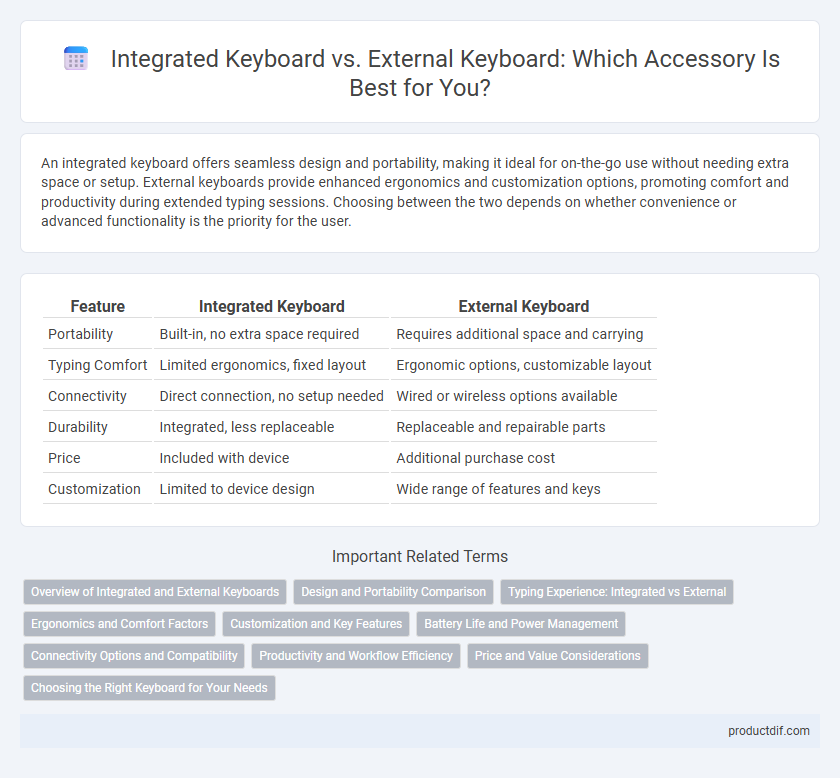An integrated keyboard offers seamless design and portability, making it ideal for on-the-go use without needing extra space or setup. External keyboards provide enhanced ergonomics and customization options, promoting comfort and productivity during extended typing sessions. Choosing between the two depends on whether convenience or advanced functionality is the priority for the user.
Table of Comparison
| Feature | Integrated Keyboard | External Keyboard |
|---|---|---|
| Portability | Built-in, no extra space required | Requires additional space and carrying |
| Typing Comfort | Limited ergonomics, fixed layout | Ergonomic options, customizable layout |
| Connectivity | Direct connection, no setup needed | Wired or wireless options available |
| Durability | Integrated, less replaceable | Replaceable and repairable parts |
| Price | Included with device | Additional purchase cost |
| Customization | Limited to device design | Wide range of features and keys |
Overview of Integrated and External Keyboards
Integrated keyboards are built directly into devices such as laptops, offering portability and space-saving design with limited customization options. External keyboards connect via USB or Bluetooth to desktops, laptops, or tablets, providing enhanced ergonomics, durability, and a variety of key switch types tailored to user preferences. Both types differ significantly in functionality, flexibility, and user comfort depending on the computing environment.
Design and Portability Comparison
Integrated keyboards offer a sleek, compact design that seamlessly fits within the device's chassis, maximizing portability for users on the go. External keyboards vary from ultra-slim models to mechanical options, providing ergonomic benefits but adding bulk and weight, which can hinder mobility. Choosing between the two depends on balancing the need for portability with typing comfort and device aesthetic preferences.
Typing Experience: Integrated vs External
Integrated keyboards offer a compact typing experience with keys designed for portability and minimal travel, often found in laptops and tablets, which may lead to faster fatigue during extended use. External keyboards typically provide a more comfortable typing experience due to greater key travel, ergonomic design, and customizable layouts, which enhance accuracy and reduce strain. Mechanical external keyboards are especially favored for their tactile feedback and durability, significantly improving long-term typing comfort and speed.
Ergonomics and Comfort Factors
Integrated keyboards often compromise ergonomics due to their fixed placement and limited key travel, which can lead to wrist strain during prolonged use. External keyboards provide greater comfort through adjustable angles, tactile feedback, and the option to select ergonomic designs like split or mechanical layouts. Users seeking long-term typing comfort typically benefit more from external keyboards that reduce the risk of repetitive strain injuries.
Customization and Key Features
Integrated keyboards offer limited customization options and basic key features designed for general use, often prioritizing compact design over flexibility. External keyboards provide extensive customization possibilities, including programmable keys, mechanical switches, and enhanced ergonomics tailored to individual preferences. Gamers and professionals favor external keyboards for their advanced key rollover, backlighting options, and durable build quality that surpass integrated models.
Battery Life and Power Management
Integrated keyboards in laptops often consume less power as they are optimized with the device's internal power management system, resulting in longer overall battery life. External keyboards, especially wireless models, require separate power sources like batteries or USB power, which can drain their own energy and indirectly impact the connected device's battery efficiency. Selecting an external keyboard with low-power Bluetooth technology and efficient sleep modes can mitigate battery consumption and enhance power management.
Connectivity Options and Compatibility
Integrated keyboards offer seamless connectivity with devices, eliminating the need for additional cables or wireless connections, which enhances portability and reduces clutter. External keyboards provide a variety of connectivity options including USB, Bluetooth, and wireless receivers, catering to different device compatibilities and user preferences. External models often support cross-platform compatibility with Windows, macOS, and Android, while integrated keyboards are typically limited to the host device's operating system.
Productivity and Workflow Efficiency
Integrated keyboards offer seamless device portability and immediate access, enhancing productivity by reducing setup time and minimizing workspace clutter. External keyboards provide ergonomic benefits, customizable layouts, and enhanced key travel, which improve typing speed and reduce fatigue during prolonged work sessions. Choosing an external keyboard often leads to better workflow efficiency through increased comfort and specialized functionality tailored to professional tasks.
Price and Value Considerations
Integrated keyboards generally offer better value for budget-conscious users due to their lower overall cost and reduced need for additional peripherals. External keyboards, while often pricier, provide enhanced durability, customizable features, and ergonomic benefits that justify their investment for professionals and heavy users. Evaluating long-term usability and specific feature requirements remains crucial in determining the best price-to-value ratio between these accessory options.
Choosing the Right Keyboard for Your Needs
Choosing the right keyboard depends on factors such as portability, typing comfort, and functionality. Integrated keyboards offer convenience for mobile devices and compact setups, while external keyboards provide ergonomic designs, customizable keys, and enhanced typing speed. Prioritize user preferences and specific tasks like gaming, programming, or casual use to select a keyboard that maximizes productivity and comfort.
Integrated Keyboard vs External Keyboard Infographic

 productdif.com
productdif.com